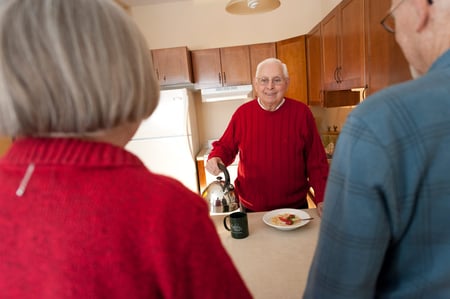Eat well, live well: How to foster senior health

Fueling the body for longevity is important at every age, but it is especially crucial for older adults to receive the nutritional care they need to continue aging gracefully.
Eating the right foods can significantly decrease your loved one’s chances of developing chronic health issues like heart disease, diabetes, and even malnutrition. And while many people know this, the reality is that providing proper nutritional care can be difficult and time-consuming. Many seniors don’t consume a well-rounded diet, and their bodies, minds, and overall health can suffer.
In order to build a healthy and balanced diet for your family member, you need to consider the essentials of proper nutrition, and how these rules may evolve over time.
As we get older, our needs change.
As you mature throughout your 30s, 40s, and 50s, you’ll notice that your body has different nutritional needs at different times. For example, the more active you are, the more calories you’ll need to consume.
As you age, you may also shift your nutritional priorities. We can’t continue the haphazard diet of our 20s, and many adults start to eat more vitamin-rich foods to strengthen the immune system or begin to consume less sugar to decrease the likelihood of diabetes.
Adults in their later years will often become less active. This may be a result of having less energy or suffering from muscle and joint pain that makes physical activity and exercise unpleasant. As older adults become less active, they’ll start to require fewer calories to maintain a healthy weight.
However, aging can also cause a loss of appetite among certain people. In these situations, it can be difficult to get a loved one to eat enough to maintain proper nutrition.
Walker Methodist knows that living well begins with eating well, and we know that every resident has their own unique needs. We encourage families to join us in our hands-on approach to monitoring the behaviors and eating habits of their family members.
In or out of a care community, the following are useful tips for helping your loved ones maintain a healthy diet as they age.
The essentials for healthy living:
Prioritize nutrient-rich foods
Nutrient-dense foods are the priority: fruits, veggies, beans, nuts, whole grains, and lean proteins. We like to limit foods high in calories but low in nutrients (like desserts, deep-fried foods, and sweetened sodas).
Maintain a healthy fiber intake
Eating enough fiber will ensure your family member maintains a healthy digestive system, and will even encourage better cholesterol levels. If it’s hard for your family member to maintain their fiber levels, you could consider adding a fiber supplement.
Be picky about convenient foods
If your loved one wants to maintain their independent lifestyle, they may start to veer towards more easily prepared meals. But convenient doesn’t always mean healthy. When selecting easy-to-prep foods, look for low sodium canned vegetables, unsweetened canned fruit, pre-cooked rotisserie chicken, or instant oatmeal for quick, healthy options.
Consider supplements
Some vitamins or minerals are simply more difficult for older Americans to absorb in their day-to-day diet. Calcium, vitamin D, magnesium, and vitamin B-12 may need to come in pill form if they are difficult to get enough of through food alone.
Hydrate. Hydrate. Hydrate.
This goes for everyone, but for seniors, daily water intake tends to plummet. Encourage your loved one to drink water even if they aren’t thirsty, and cut back on sweetened drinks.
The dangers of malnutrition and calorie-deficiency
Malnutrition is a serious senior health issue, and many people don’t understand the factors that contribute to it.
 As we age, our senses begin to shift and change. Often, a loss of appetite may be the result of your loved ones’ declining taste and smell. If they have difficulty swallowing or chewing, or have dental problems, it may deter them from eating sufficiently.
As we age, our senses begin to shift and change. Often, a loss of appetite may be the result of your loved ones’ declining taste and smell. If they have difficulty swallowing or chewing, or have dental problems, it may deter them from eating sufficiently.
A few big contributors to malnutrition are illness, dementia, depression, and reduced social contact. Your loved one may simply forget they haven’t eaten if they are suffering from memory loss, or they may be used to consuming meals with friends and lose their desire to eat alone.
Regardless of why, we understand the serious implications of malnutrition in seniors. Malnutrition can lead to a weakened immune system, poor wound healing, muscle weakness and atrophy, higher risk of hospitalization, and even a shortened lifespan.
Making a healthy lifestyle easy.
At Walker Methodist we monitor eating habits, sleep, weight loss, and physical activity around the clock because we know diet and lifestyle are vital to healthy aging. We offer tailored menus and recipes for our residents, which prioritize their nutritional needs as well as their likes and dislikes.
Getting older comes with its challenges, and your loved one isn’t meant to do it alone. Walker Methodist strives to not only provide the best nutritional and dietary options for our residents, but we aim to educate families along the way as well.
It’s a collaborative effort, and we welcome your involvement in the journey towards a nurturing, graceful aging process for your loved one. Contact Walker Methodist today to learn more about how you can provide a healthy future for the one you love most.
Editor’s Note: Today’s guest column on the potential for a “business bonanza” in 2025 comes from Manward Press Chief…
Copyright © 2025 Retiring & Happy. All rights reserved.









